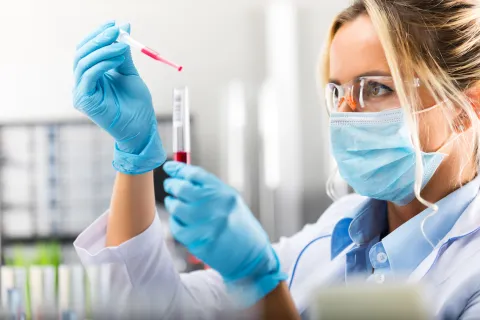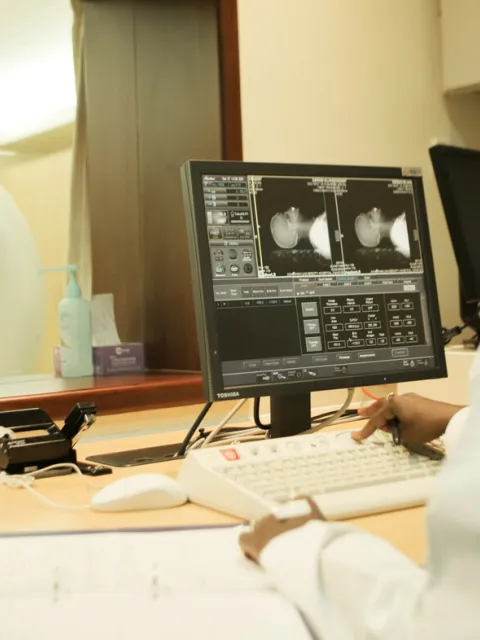Closing the care gap in early cancer detection
Multicancer detection involves a blood test to screen for several cancers at the same time and therefore holds the promise of improving survival rates around the world.

Early detection, when cancer is either detected before symptoms develop, or very shortly after, is an important contribution to the control of some cancers. Screening tests for breast, cervical, colorectal, lung and prostate cancers are already in place in many countries. They are conducted “routinely” – in other words not when there are symptoms or suspicions of disease but according to specific criteria (age, health and family history) that contribute to a higher risk of developing the cancer – in an attempt to detect cancer at an early stage when it can be treated more successfully.
For many cancers, however, there is no proven strategy for early detection. Therefore, these cancers are most often diagnosed at an advanced stage when treatment options are more limited and less successful.
This situation might soon change. Over the last years, there have been important advances in laboratory methodology for the discovery of biomarkers, or those indicators that reveal the presence and severity of a disease. These advances have generated the potential to conduct cancer screening for several organs at the same time with a single blood test, rather than a separate (and often more invasive) test for each different cancer type.
“The potential of this technology to close the care gap in health systems around the world is exciting. The next steps would be to work with health providers and communities on the ground and determine how this technology can be implemented both in high- and low-resource settings.”
– Dr Sonali Johnson, Head, Knowledge, Advocacy and Policy at UICC, and co-author in the Cancer supplement, “Multicancer early detection: Accelerating Progress through International Collaboration”
If proven to be clinically effective, a multicancer early detection (MCED) strategy has the potential to reach underserved populations and improve the rate of participation in cancer screenings, and therefore the chances of survival for those diagnosed with cancer. These technologies could transform the ways in which health services manage cancer in countries around the world – including in low-resource settings, where the burden of cancer-related deaths is highest due to the high rate late-stage diagnosis.
While low- and middle-income countries (LMICs) cannot generally access new, life-saving health technologies due to costs and trained staff, multicancer early detection could be transformative as investments in this new technology would enable countries to gain the benefits of early cancer detection without having to invest in costly screening and diagnostics separately for different cancers.
“Today, most cancer is detected when people present with symptoms, which is too often after the disease has already progressed. Simple, accessible multicancer early detection blood tests could provide the opportunity to detect more cancers earlier before signs and symptoms appear and when treatments are more effective. To realise the full benefits of this potentially transformative approach to cancer detection, all stakeholders will need to work closely together.”
– Dr. Paul Limburg, Gastroenterologist at Mayo Clinic, Chief Medical Officer for Screening at Exact Sciences and lead organiser of the summit from Mayo Clinic, and co-author in the Cancer supplement, “Multicancer early detection: Accelerating Progress through International Collaboration”
On World Cancer Day in 2020, an international, interdisciplinary summit was hosted by UICC, the Mayo Clinic and the American Cancer Society in Rochester, Minnesota, to discuss the potential of an MCED test from different perspectives, including pre-clinical research, clinical research, adopting an international perspective, regulatory approval and access, economic modelling, industry engagement and patient engagement and advocacy.
More than 50 participants attended representing clinicians, researchers, advocates, and industry. These discussions formed the basis for seven articles published last February 2022 in a ground-breaking supplement of the journal Cancer, “Multicancer early detection: Accelerating Progress through International Collaboration”
“We hope that these articles on multicancer early detection will stimulate new thinking about the potential opportunity for these technologies, and especially contribute to the development of new strategies to evaluate their effectiveness in the population. We are challenged to do just that, since it is no longer practical or feasible to study a new screening technology as we have done in the past, one cancer site at a time, with a study design that involves a commitment of 15 years or longer.”
– Dr Robert Smith, Senior Vice President of Cancer Screening at the American Cancer Society, and co-author in the Cancer supplement, “Multicancer early detection: Accelerating Progress through International Collaboration”
Last update
Monday 21 March 2022
